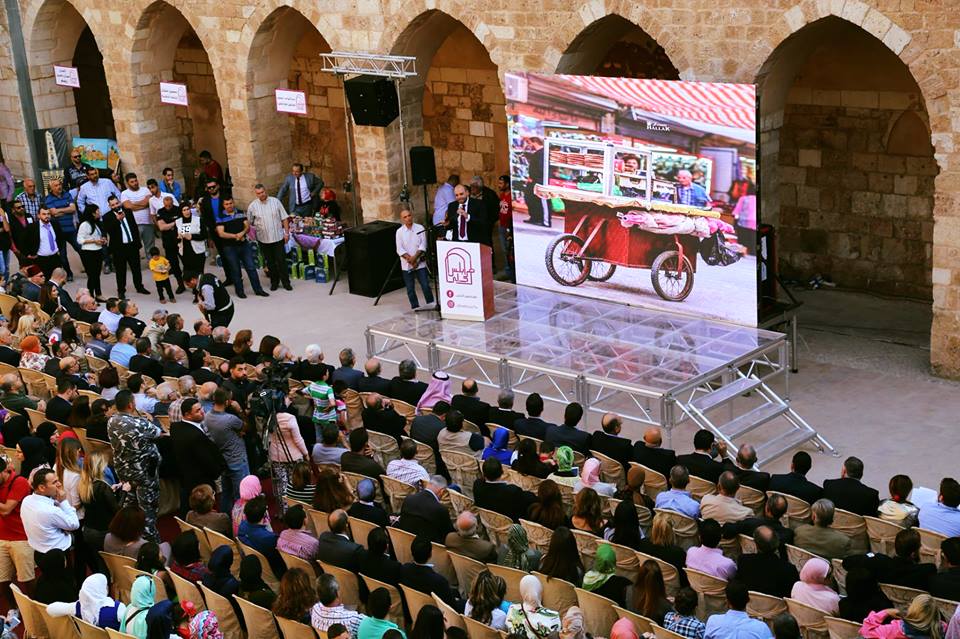
Alaa Jundi, 27, from Tebbaneh outside Tripoli, Lebanon, didn’t have the chance to continue his education. But he loved the arts and had an ambition of being an actor one day. After feeling hopeless that he had no opportunities, he took art classes that were part of a World Bank project to build his skills. “At first, I felt this was a dream, I was just participating to fill my time and practice my hobby.” But the skills he learned led him to opening an entertainment company with a colleague to host kids’ birthday parties and events.
Fatme Ahmad, 22 and from Tebbaneh, also didn’t have the chance to continue her education for several reasons. So, she searched for any opportunity to help her build capacity. “I knew that there were soft skills trainings that could help me in finding a job in the future,” she said. Thanks to a World Bank program, she was able to participate in computer and English workshops for 4 months, where she became very skilled at certain computer programs. “Now, I am working as a secretary in this new opportunity that opened a whole door for me to find jobs and build a new life!”
Alaa and Fatme are just two examples of young, marginalized people in Tripoli who are benefitting directly from new initiatives to improve tourism and bring activities and arts events back to their community.
Tripoli is the largest city in northern Lebanon and the second-largest city in the country. In the last decade, it has gone through many conflicts and clashes, and, most recently, the effects of the Syrian crisis. Because of these issues, young people found themselves with less opportunities, and the rate of unemployment skyrocketed to 60% for youth. The school dropout rate in the city’s marginalized areas was around 50%, and the poverty rate in the city is around 40%.
To combat all these issues and feelings of hopelessness which lead to crimes and extremism, young people like myself wanted to increase our responsibility and role in improving our city. So, we started working on initiatives to increase tourism back to Tripoli, a big driver of economic growth and jobs. Tourism is important to Tripoli due its heritage, home to 136 ancient monuments, old mosques and churches, seven specialized market khans (souqs), and islands.
So, we launched our tourist social enterprise in 2017 called “Trablos Ahla” (Tripoli is More Beautiful) with the aim of improving tourism and the artisanal sector by conducting different types of activities and events.
The World Bank Cultural and Urban Heritage Development (CHUD) project helped us with financing for this initiative in Tripoli’s old town where Abou Ali River runs through, and which is home to ancient monuments that were either semi-destroyed or full of garbage. The Abou Ali River is is also home to the ancient Phoenician city-states of Sidon, Tyre, and Arados Island.
To date, 350 young people have directly benefited from the project through capacity building, vocational training, and income generation. Many participated in soft-skills trainings to better their chances at getting a job. Others benefited from learning to become tour guides and giving tours to make money as part of the “Trablos Ahla” initiative.
The revitalization of “Khan El Askar,” a famous old souk in Tripoli, was another project financed by the World Bank CHUD project. The project rehabilitated this old souk which was crumbling before and it became a location for us to train young people to be tourist guides, and then became one checkpoint for our tours.

Another 1,000 young people have benefited indirectly from the activities in the revitalized Khan El Askar. They take part in cultural entertainment, handicrafts, and other types of arts activities. Many have said to me that they see things that they’ve never taken part in before or had a chance to experience.
Omar Chaker, 20, hails from Kobbeh, Tripoli, an area that experienced clashes in the last years. He was grateful for these youth and tourism projects, as they helped him find a job as a tourist guide. “It was the first time I knew that there was this type of artisanal work and tourism in our city,” he said. “I am very happy that my city has these special things and I’m proud of being a part of something special in Tripoli.”
Hanin Ibrahim, 27, is another young woman who benefitted from the project by becoming a tour guide. “The first time I visited the old town it was during my volunteering for the launch event of “Trablos Ahla,” she said. “In the beginning I was afraid to go there, but when I visited Khan el Askar, I felt that I was not in Lebanon. I saw an amazing spot!” She saw the potential it had for many projects, and since then continues to be part of this initiative to improve tourism in the city.
And we are also finding support in Lebanon’s Minister of Culture, Dr. Ghattas Khoury. After attending the successful launch event for “Trablos Ahla” last year, he has been very cooperative with the youth and working on the sustainability of the Khan Al Askar. Two months ago he assigned a board of the director for the Khan and allotted a budget to implement cultural activities there, a very good step for the future.
What is important for Tripoli’s youth is to use the resources of the city to increase their civic engagement as well as income generation and economic livelihood. As we mentioned before, this city has passed through some very bad conditions, but it still has a lot of resources to be used and much hope for young people to improve their lives.


Join the Conversation